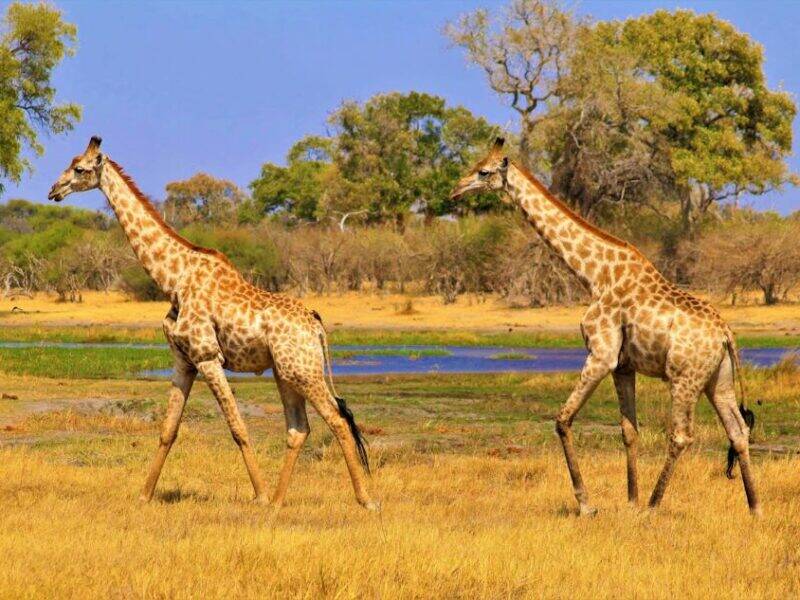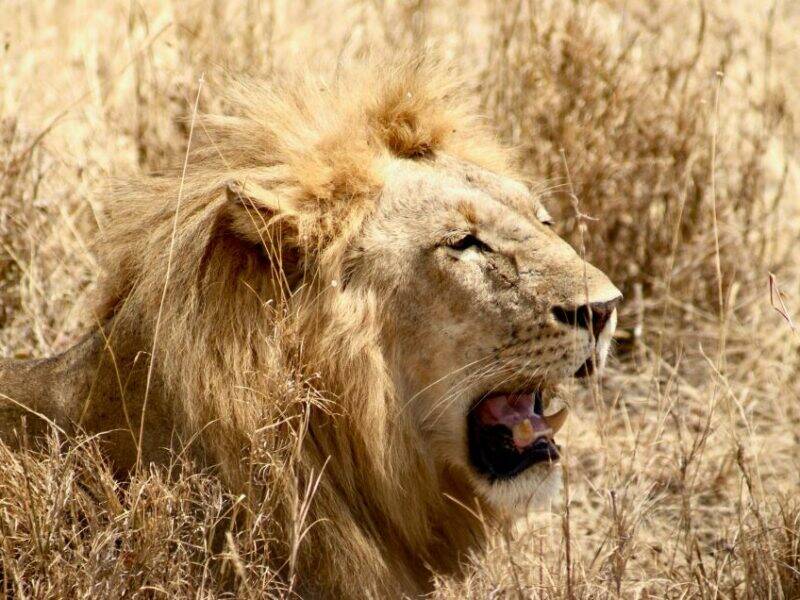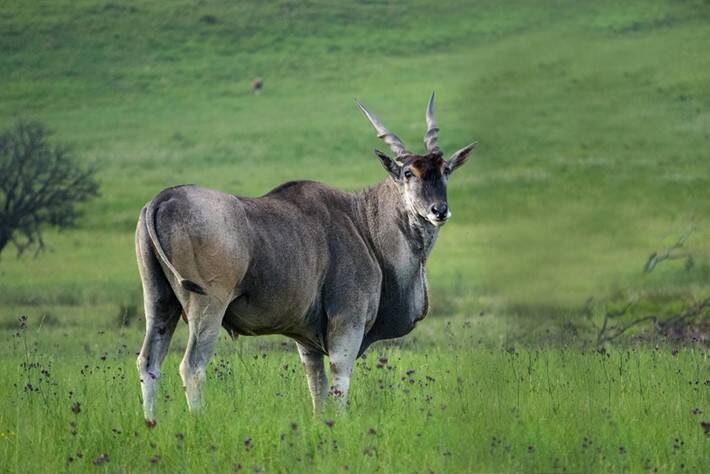Tanzania is considered a safari hunting jewel by experienced and novice hunters alike. Around 75% of Tanzanian territory consists of game reserves, wildlife parks, and hunting areas; these areas include different landscapes and a variety of big game hunting species for an exciting hunting adventure.
And with most of these reserves being unfenced, the wildlife is allowed to roam freely and unobstructed, giving you the opportunity for one of the most real experiences of untamed nature you can find when game hunting in Africa.
[DYNAMIC-BLOGTABLEOFCONTENT]
Popular Targets When Safari Hunting in Tanzania
Tanzania carries a diverse range of wildlife, from members of the Dangerous 7 to various African plains game species. Regardless of whether you’re looking for a lion or hartebeest, buffalo or crocodile, this amazing East African big game hunting country has something for everyone to enjoy on their African hunt.
Any Tanzania hunting safari offers you a wide variety of potential targets and trophies. Listed below are some examples of the wildlife that awaits.
- Lion
- Elephant
- Leopard
- Buffalo
- Coke and Lichtenstein Hartebeest
- Eland
- Oryx
- Crocodile
- Sable
- Roan
- Topi
- Lesser Kudu
- Sitatunga
- Zebra
- Oribi
- Puku
On an important note: Giraffes, wild dogs, cheetahs, and rhinos are protected species and are not allowed to be hunted under any circumstances.

Game Hunting Areas in Tanzania
Game hunting in Africa should be on every hunter’s bucket list, and Tanzania should be near the top. With an aura of untouched wildness and an expanse of wildlife no matter where you find yourself, this territory has what you’re looking for, just be sure to situate yourself in the best area possible when safari hunting in Tanzania.
Tanzania offers a variety of hunting safari areas in some of the most pristine reserves and parks worldwide. With certain areas affording better opportunities to target specific species, it’s wise to do a bit of research in line with your choice of target species for your Tanzania hunting safari.
Types Of Hunting Areas in Tanzania
Game Reserves
These areas have restricted entry and only licensed tourist hunting is allowed. No human inhabitation is allowed and activities such as wood cutting, and animal grazing are prohibited.
Buffer Zones
These areas, usually around 0.6 miles, of a park or reserve border are an added layer of security. In these areas select activities such as small-time grazing, limited firewood collection, and ecotourism are allowed as a benefit to the community
Wildlife Management Area (WMA)
Local communities use these designated areas within their village boundaries. Some WMA’s do allow hunting.
Game Control Areas (GCA)
Any activities that can negatively impact wildlife are strictly prohibited in these areas.
Popular Tanzanian Hunting Destinations
Selous Game Reserve
This game reserve is the largest in the world and holds no human development within its boundaries. A prime safari hunting area, especially for dangerous game, Selous offers lion, leopard, elephant, crocodile, wildebeest, and other buck species.
The landscape of this reserve is marked by Miombo – woodland, bush, and rocky outcrops depending on the area.

Masailand
Offering buffalo, leopard, gazelle, and kudu amongst others; this scenic area has something for every hunter. The Masailand area covers Acacia bush, open plains, rocky outcrops, and thorn bushes.
Moyowosi and Ugalla Game Reserves
These Tanzanian reserves are known for floodplains, sprawling savannahs, and swamp land. It’s recommended to plan your safari hunting in the dry season if visiting these reserves due to the landscape. Ugalla is famous for producing crocodiles measuring over 17 feet.
In general, both reserves could offer you prime lion, leopard, hippo, and plains game; with the chance of carrying out your hunt via elevated swamp blinds or by canoe.
Other Popular Areas
Other areas for your Tanzania hunting safari include the Kizigo Central Area, Monduli Juu, and Moyowosi Njigwe Game Reserve.
Climate: The Best Time To Go Safari Hunting In Tanzania
Weather, as much as we’d like to predict it, can often go the opposite of what we want. This can affect anything from what areas you can access to animal behavior. The climate will also factor into your choice of clothing as well as when your game hunting adventure could take place. By familiarizing yourself with the local climate before your safari hunting expedition, you could save yourself time and unnecessary events.
The climate you’ll experience when safari hunting in Tanzania depends on the area in which you find yourself. The highland regions experience temperatures between 50- and 68-degrees Fahrenheit, regardless of the season or rainfall. This East African country has a summer season from November to February where minimum temperatures start in the high 70s and reach the low 90s. Winter runs from May to August when temperatures range from 55 degrees Fahrenheit to the low 60s.
In general, Tanzania’s wet and dry seasons can be summarized as follows:
- A short dry season January–February, first rains start in March.
- March–May is the longer of the two rainy seasons, and these rains usually occur in the afternoons. Both temperatures and humidity will be high.
- June–October is said to be the best time to hunt, as this is the longest dry season.
- A shorter rainy season follows November–December, these rains are lighter but more unpredictable.
- Monsoons typically affect coastal areas from July–October.
The Essentials To Consider On A Hunting Safari in Tanzania
Planning your hunting excursion, just like any holiday, requires you to familiarize yourself with some of the conditions and potential challenges you might encounter on your game hunting trip.
Things To Remember When Game Hunting In Tanzania
- Swahili is the predominant language in Tanzania, but English is spoken across many institutions and is a medium of education as well as the language used when dealing with foreigners and foreign business.
- Tanzania, like many African countries, still finds itself plagued by occasional outbreaks of malaria and cholera. These conditions are preventable and hunters/visitors are asked to do their part in ensuring their safety. In the case of malaria, it’s asked that people cover as much flesh as possible, including ankles, the back of the neck, arms, and feet. Use a mosquito repellant containing DEET and make use of the mosquito nets, repellant devices, or other measures provided in your lodge or accommodation. Do not drink water from rivers or natural bodies to reduce your risk of cholera, stick to bottled or purified water.
- Be sure to also protect yourself from the sun and its effects like sunburn and heatstroke. The African sun is harsh and given Tanzania’s climate, it is wise to wear loose clothing or clothing with a UPF factor, regularly apply sunscreen, and make use of a hat and sunglasses.
- If you are able, avoid the midday heat and be sure to stay well hydrated.
- On the other hand in the cooler, rainy seasons, be sure to pack raincoats or ponchos, suitable shoes, and a change of clothing if necessary.
- It’s asked that those visiting Tanzania carry their passport and identity documents at all times as checkpoints pop up regularly. Similarly, visitors are urged not to photograph military, police, or other official buildings, checkpoints, and personnel.
- Due to occasional conflict and the risk of bandits, you are strongly advised to not go within 20 miles of the Mozambican border (this is in the Mtwara region).
Traveling to Tanzania
You’re most likely to arrive at one of Tanzania’s two main airports, Julius Nyerere International Airport in Dar es Salaam or Kilimanjaro International Airport near Arusha.
From these two airports, many domestic or charter flights can be taken to various local destinations. Charter flights are recommended for traveling between hunting destinations.
Important Regulations, Documents And Paperwork
- All travelers to Tanzania are required to have a passport that is currently valid and will be valid for 6 months after departure. Most foreign visitors will also need to apply for a visa, to check if this is necessary for you and to apply visit the Tanzanian Electronic Visa Application System.
- Alternatively, you can visit the Tanzanian consulate in your home country if one is available. Here you can check for requirements and complete the process which usually involves a form, recent passport photos, and the visa fee.
Hunting and Firearms Permits
When hunting in Africa, be sure to familiarize yourself with the regulations regarding firearms and ammunition as these vary from country to country.
The following are a few of the general rules you will encounter when planning safari hunting in Tanzania. For more detailed or specific information with regulations speak to your outfitter.
- All hunting excursions in Tanzania require a hunting permit.
- All hunters must be over the age of 18 years.
- Permits are strictly available as 10, 16, and 21-day permits. If your hunt is 7 days, you will still need to procure the full 10-day permit, etc.
- Longer hunting permits generally allow for more variety in the targets chosen. For example:
- A 10-day permit allows a hunter to target buffalo and select plains game in specified numbers.
- A 16-day permit includes crocodile and waterbuck species.
- A 21-day permit (considered the gold standard) allows for lion, leopard, elephant, sable, and roan amongst others.
- Each individual hunter requires their own permit.
- The species’ quota can change at any time, this can be checked with your outfitter.
- If you are bringing your own firearms, you will need to provide your outfitter with all your weapon’s details for permit applications, this will include photographs of the rifle and serial number.
- Only 3 rifles are allowed per hunter with 100 rounds per rifle, all automatic weapons and handguns are strictly prohibited.
- If you plan on using weapons provided by the outfitter, you will need to check for availability ahead of time.
Hunting Laws and Regulations
Some of the laws regarding safari hunting in Tanzania are listed below. For further information or to check for updated regulations speak with your outfitter or online Tanzanian hunting resources.
- The official Tanzanian hunting season runs from 1 July–31 December.
- All hunts require a government guide to ensure that no laws have been broken and that all trophies are of size. The guide will sign the hunting license off at the end of the hunt when all checks have been completed.
- All trophy hunting must take place during daylight hours, usually 05:30 and 18:30. No night hunting or hunting by artificial light is allowed.
- No animal may be hunted from a vehicle or chased by a vehicle, when taking your shot you need to be at least 218 yards from the vehicle.
- No hunting may take place within 546 yards of a permanent watering hole, pool, or salt lick. The only exceptions are when hunting crocodile, waterbuck, bird, puku, and sitatunga.
- The hunting of pregnant females and females with dependent young or juvenile animals is not allowed. This can result in a fine and you will still be required to pay the trophy price.
- Minimum caliber for dangerous game is .375 and for other game the minimum caliber is .240
- The use of bait for leopard or lion hunting is allowed, provided that the bait is also a licensed hunt.
Specific Species Laws & Regulations
- No lion under the age of 6 years may be hunted or targeted.
- When targeting elephants, tusks must weigh a minimum of 39.6 pounds and measure over 5.2 feet.
- Leopard targets must measure over 4.9 feet nose to tip of tail and crocodiles must measure over 9.8 feet minimum nose to tail tip.
Game Hunting Trophies: Regulations And Permits
- Certain species like lions, elephants, leopards, and hippos require a CITES I or II permit before you will be allowed to bring home your trophy. These permits are the responsibility of the hunter.
- United States Forestry and Wildlife requires an enhancement permit as well as a CITES permit for all Tanzanian elephant trophies.
- Elephant trophy imports to the European Union and Australia are banned.
- Lion trophies require a CITES II permit as well as an official assessment to prove that the trophy is of legal size.
These regulations, like others, can be altered at any time and it’s always recommended to check with your outfitter or service provider for updates and changes.
Why Choose Tanzania For Your Safari Hunting Adventure?
Tanzania offers the widest variety of landscapes and wildlife. With so many areas seemingly untouched by human life and thriving as nature intended, you’d be forgiven for thinking you’d stepped into an Eden.
You can find many stories of big game hunting and tales of prized trophies that all originate from this gem of the African continent.
Safari hunting in Tanzania is an opportunity you should not hesitate to grab. Whether you’re looking for a dangerous game, including members of the Big 5, or a choice of some of Africa’s best plains game, this hunter’s paradise has got what you’re looking for.
And if your group is going to include members who aren’t going to participate in the hunting, be rest assured. There are many things to do in and around Tanzania that are sure to keep the non–hunters occupied and satisfied. From tours to some of the most breathtaking natural scenery like the Ngorongoro Conservation area, art, and cultural sites and experiences as well as un-spoilt beaches offering adventure, snorkeling opportunities, and even plain old relaxation.
Please note: These rules, regulations, and information can be altered at any time and it’s always recommended to check with your outfitter or service providers for any updates and changes.
Author: A. Baker
